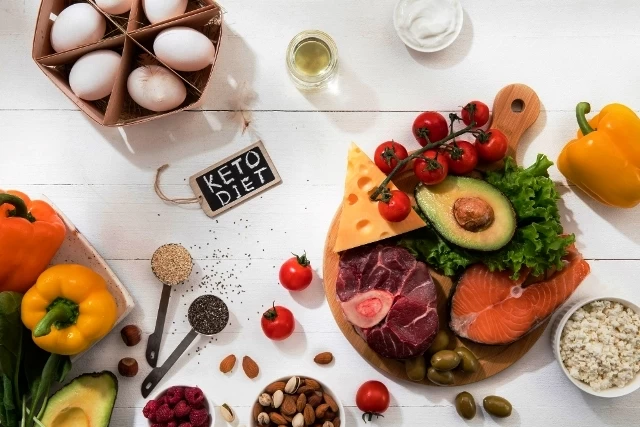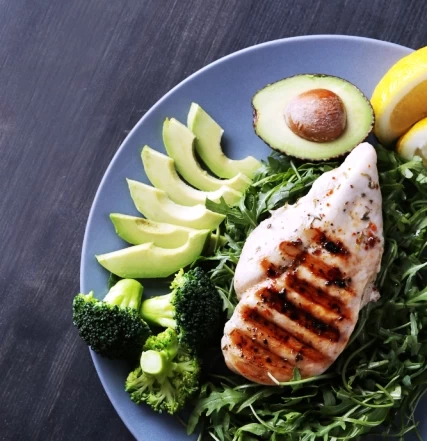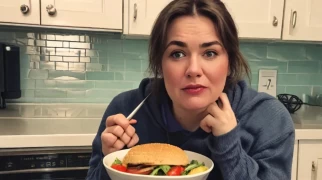
Burning Fat through Fat Consumption: The Ketogenic Diet
- Burning Fat through Fat Consumption: The Ketogenic Diet
- What is a Ketogenic Diet?
- What Can be Consumed on a Ketogenic Diet?
- What Can't be Consumed on a Ketogenic Diet?
- What Are the Negative Effects of a Ketogenic Diet?
What is a Ketogenic Diet?
The ketogenic diet, which has become quite popular in recent years, is a nutritional regimen that aims to meet the body's energy needs from fats instead of carbohydrates, differing from traditional eating habits. It first emerged in the 1920s as a diet protocol for epilepsy treatment, involving a daily intake of fewer than 50 grams of carbohydrates.
Although the ketogenic diet may be perceived as a high-protein diet, it is not entirely true. While carbohydrate intake is restricted, protein intake is maintained at an appropriate level. With daily carbohydrate intake below 50 grams, the body produces ketone bodies, which are used as an energy source, thus promoting fat burning. Particularly, impressive fat loss has been observed in obese individuals following this diet model.
However, if the ketogenic diet is not applied in a controlled manner, various side effects associated with ketosis may occur. The most common side effect is usually bad breath. Additionally, excessive thirst, frequent urination, dehydration, nausea, vomiting, diarrhea, abdominal pain, headache, and even confusion may be experienced. Moreover, a diet program rich in protein and fat may pose risks to heart, kidney, and bone health. For this reason, the ketogenic diet can be applied under medical supervision as part of a treatment protocol for a short period, but it is not recommended as a long-term and continuous dietary plan. The macro-nutrients in the ketogenic diet (carbohydrates, fats, and protein) are calculated based on the individual's weight, typically resulting in a diet consisting of 75% fat, 20% protein, and 5% carbohydrates.
Research indicates that the ketogenic diet can help suppress appetite and support fat burning through ketosis. A study published in a medical journal suggests that a ketogenic diet low in carbohydrates and protein, but high in fat, can help to kill pancreatic cancer cells when combined with triple drug therapy.
What Can be Consumed on a Ketogenic Diet?
On a ketogenic diet, animal-based foods, natural and healthy fats, and low-carbohydrate vegetables are primarily consumed. Foods such as red meat, chicken, fish, seafood, turkey, eggs, and cheese can be consumed in specific amounts.
Similarly, leafy green vegetables, cucumber, broccoli, cauliflower, cabbage, zucchini, mushrooms, all spices, and sugar-free sauces are allowed. Red fruits such as strawberries, raspberries, blackberries, and blueberries can also be included in the diet.
As the ketogenic diet is fat-focused, olive oil, butter, plain fat (ghee), avocados, fatty seeds, and other natural oils can be included in your meal plan.

What Can't be Consumed on a Ketogenic Diet?
The ketogenic diet restricts the consumption of foods containing carbohydrates. Products such as wheat, barley, rye, oats, corn, rice, and simple sugars, as well as fruits and fruit juices, root vegetables such as potatoes, and legumes like chickpeas, kidney beans, lentils are limited due to their carbohydrate content.
What Are the Negative Effects of a Ketogenic Diet?
The restricted intake of carbohydrates in the ketogenic diet may lead to deficiencies in certain vitamins and minerals. B vitamins, potassium, calcium, selenium, zinc, and other vitamins and minerals should be monitored and supplemented if necessary by a healthcare professional.
Likewise, the low carbohydrate content may result in a lack of dietary fiber, negatively impacting the intestinal flora.





